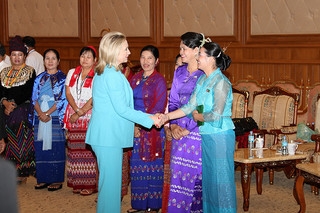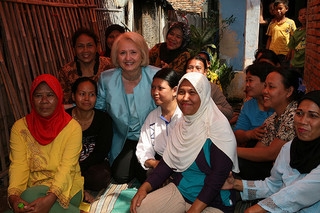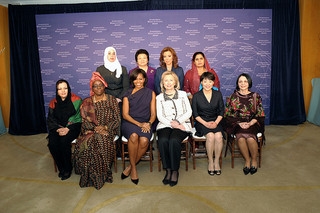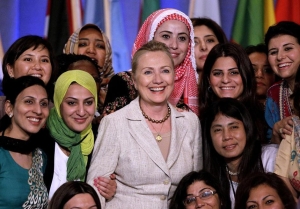Public Diplomacy as a Tool for Advancing Women’s Issues and Closing the Gender Gap
Since President Obama and Secretary Clinton appointed me the United States’ first Ambassador-at-Large for Global Women’s Issues in 2009, I have traveled to more than 50 countries, and met with women and men from all walks of life. I have met with a wide range of people – from corporate CEOs, to women leading grassroots NGOs. And wherever I’ve gone, I have sought to use the tools of public diplomacy to convey the same, simple message: that empowering women – protecting their rights, recognizing their voices, and investing in their potential – is essential to achieving peace, prosperity and stability around the world. In short, as my boss Secretary of State Hillary Clinton says, it is not just the right thing to do, it is the smart thing to do.
Over the past four years, promoting women’s rights has been integrated into the Obama Administration’s formal diplomatic efforts. Secretary of State Clinton, and President Obama signaled to the world that women’s issues would be integral to U.S. foreign policy when they granted Ambassadorial rank to the State Department’s chief advisor and advocate for women. Secretary Clinton regularly raises women’s rights in her meetings with foreign minister counterparts, and in high-level multilateral summits such as Asia-Pacific Economic Cooperation (APEC) and the G-8. Women’s issues have been integrated into the United States’ annual dialogues with China, India, and Indonesia. We have signed formal Memoranda of Understandings with the governments of Brazil, Mexico and Norway to work together to promote women’s rights including combating violence against women around the world.
In April, Secretary Clinton issued the first-ever policy directive on gender, requiring the Department of State and our Foreign Service officers to use “every tool at our disposal” to support and advance women around the world. The tools of public diplomacy have been absolutely essential to our efforts. Wherever she goes, even in tightly scheduled visits, Secretary Clinton makes time to meet with women of all backgrounds – students, entrepreneurs, elected leaders– as well as indigenous women and those who have been historically marginalized in their societies. The message that America stands on the side of women’s rights and considers women’s advancement key to our foreign policy is powerfully conveyed by the image of the Secretary taking the time to meet with women who are small hold farmers, factory workers, business owners, or NGO leaders, rather than perhaps a talking point conveyed to her foreign minister counterpart, or a line in a joint communiqué.
U.S. Secretary of State Hillary Rodham Clinton meets with members of the Lower House of Parliament at the Burmese Parliament in Nay Pyi Taw, Burma, on December 1, 2011.
© State Department photo/ Public Domain
Moreover, we use our public diplomacy opportunities to popularize and promote the hard evidence that investing in women and protecting their rights leads to better outcomes not just for themselves, but for entire nations. When I visit a girls’ school in New Delhi or a domestic violence shelter in Guatemala City, I help shine a spotlight on the evidence that investments in women and girls’ health and education can lead not just to better lives for individual beneficiaries but to their children’s improved health outcomes and to their nations’ economic growth. We have also used public diplomacy to focus the international public’s attention on the essential, but perhaps traditionally less obvious roles women can play in solving global challenges – from climate change to food security to ending wars and building peace. When our embassy’s political officers meet with women leaders in Afghanistan, we help promote the idea that including women’s voices in political decision-making and peace negotiations can lead to better government and longer-lasting peace treaties. When my office organizes networking meetings and trainings for women entrepreneurs in Eastern Europe, South Asia, Africa, or Latin America we help promote the fact that women-owned businesses have been and can be powerful contributors to GDP growth.
Ambassador Verveer visits USAID sponsored microfinance project in Cikarang.
© USAID/Roman Woronowyczt
At the Department of State, one of the largest gatherings held every year is the International Women of Courage Awards (IWOC) in March. Every year, the Secretary recognizes 10 extraordinary women from around the world who have demonstrated tremendous courage and commitment to justice and building better societies at home. The event is livestreamed on the Internet and widely covered in the international media. The State Department hosts the IWOC awardees on a two-week long visit to the United States to meet with leaders and regular citizens alike. In many cases, the attention we bring these women helps raise their profiles at home and even protects them from those who might oppose their work. And once again, we convey to the world the U.S. commitment to women around the world. Similarly, we and our embassies will organize events around the International Day of the Girl Child (October 10) and International Day to Eliminate Violence against Women (Nov 25), all as part of our efforts to support women in our host countries and to convey America’s commitment to these issues.
Secretary of State Hillary Rodham Clinton and First Lady Michelle Obama pose for a photo with the honorees of the 2011 International Women of Courage Awards at the U.S. Department of State on March 8, 2011.
© State Department photo/ Public Domain.
Most fundamentally, securing equal rights for women is a long quest for changing hearts and minds in countries where women’s second class citizenship has been a given for centuries. Though public diplomacy, we can help to advance this change.
Tags
Issue Contents
Most Read CPD Blogs
-
January 29
-
January 20
-
January 28
-
January 2
-
January 8
Visit CPD's Online Library
Explore CPD's vast online database featuring the latest books, articles, speeches and information on international organizations dedicated to public diplomacy.












Add comment